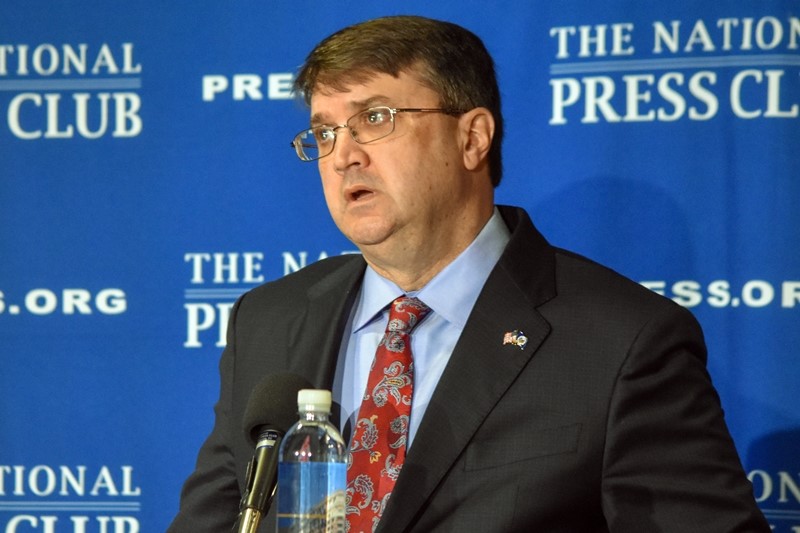Despite challenges, Wilkie calls Veteran Affairs ‘very strong’

Secretary of Veterans Affairs Robert Wilkie said former deputy secretary James Byrne was dismissed because "he did not gel with the rest of the team," at a Feb. 5 National Press Club Newsmaker event. Photo: Alan Kotok
A day after President Trump reunited a military family and recognized a 100-year-old former Tuskegee Airman during the State of the Union address, Veterans Affairs Secretary Robert Wilkie said the agency is improving its operations as it is utilized more than ever by the nation's former military personnel.
“The state of our VA is very strong and is in a position that we have not been in in many years,” Wilkie told an audience of about 50 at a Feb. 5 National Press Club Newsmaker event. The talk, about half of which was devoted to written questions from reporters, ran nearly an hour and featured the release of a VA status update.
But what Wilkie called “the new VA” has problems too, he acknowledged.
He said it was a “simple business decision” to dismiss James Byrne, because the deputy secretary didn’t “gel” with colleagues. It wasn’t, as has been reported, because of a disagreement over veteran Andrea Goldstein’s allegations she was assaulted at the VA Medical Center in Washington.
“I think what happened is that this just happened to occur when the story reemerged again,” he said. “Like any other government agency, people will come and go, and the mission goes on.”
The VA has improved customer service, beefed up mental health services, and increasingly aids women veterans, Wilkie said. It’s launching electronic health records and is slated to debut the nation’s first 5G-enabled hospital in Palo Alto, Calif., this week.
“My goal is to make sure that we have an organization that hums along,” Wilkie said. “Our veterans are coming to us in numbers that are unprecedented in our history.”
VA responds to suicide, painkiller challenges
The VA grapples with 20 veteran suicides a day.
“We are in the middle of a long overdue national conversation about veteran suicide,” Wilkie said. “This is the first time in our history that the president of the United States has focused the energies of his office and the federal government on an issue that has afflicted the armies of the United States for well over a century.”
To combat veteran suicide, it’s vital to also tackle veteran homelessness, addiction, and mental health, according to Wilkie. “If we simply look at the last tragic act in a veteran’s life, we will be doing a disservice to the entire country,” he said.
In the question-and-answer period, reporters asked about painkiller overprescription at VA hospitals, which Wilkie said the VA has reduced by 51 percent in the last four years, and allegations of sexual assault at VA hospitals. The VA immediately referred Goldstein’s allegations to the Justice Department and took it out of the hands of the VA police, Wilkie said.
New statistics show that 41 percent of women veterans are part of the VA, and women comprise 10 percent of veterans. To have seen those numbers climb “s an affirmation of how well we have advanced as a culture,” said Wilkie, who expects them to rise further.
Another way military culture is changing relates to pain management. If Wilkie had come to his father, who was injured in Cambodia, and recommended using yoga, music, or aqua therapy, it wouldn’t have gone over well.
“My nose would have been flat against my face,” he said. “It was contrary to the ethos of the warrior.” Now Wilkie has seen septuagenarian Vietnam veterans doing art therapy. “It is a whole health approach that I believe VA has set the standard for,” he said.
Wilkie praises Club, advocates for Tice's release
Wilkie’s talk was bookended by observations about journalism today, including statements that might strike some as unusual for officials in this administration.
He began by saying that the National Press Club “has a unique place in the annals of American service.” That the American Legion post established at the Club after World War I had General of the Armies Jack Pershing among its ranks is a testament to journalists’ bravery on the front lines, Wilkie said. He added that Walter Cronkite and Edward R. Murrow served as much time on the front lines as many World War II soldiers did.
Asked about veteran and journalist Austin Tice, who has been held in Syria since 2012, Wilkie said he was aware of Tice’s trials. “From VA’s perspective, we have let it be known that he is one of those front line warriors which we need to account for for his own safety and for the well being of the family,” he said.
After the event had seemed to close with applause, Wilkie said that his goal in life had been to “pretend to be someone like Ed Murrow or Richard C. Hottelet.” Journalists are on the front lines of freedom, he added.
“I mean that even in this climate. I mean it sincerely,” Wilkie said. “That’s why I never hesitate to come here and to give you as honest an assessment as I can of what is happening with America’s veterans.”
